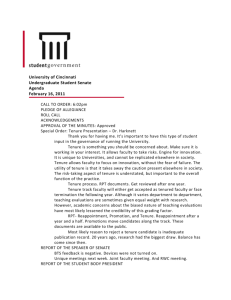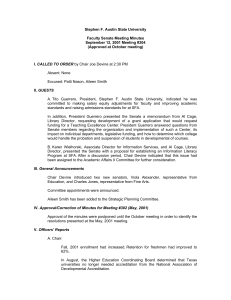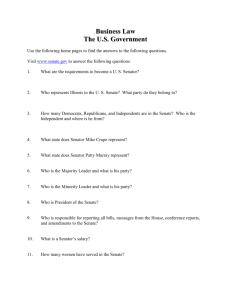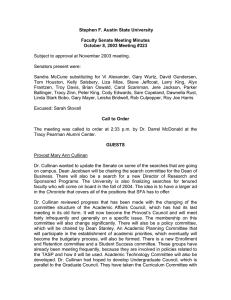Stephen F. Austin State University Faculty Senate Meeting Minutes 2004 Meeting #326
advertisement
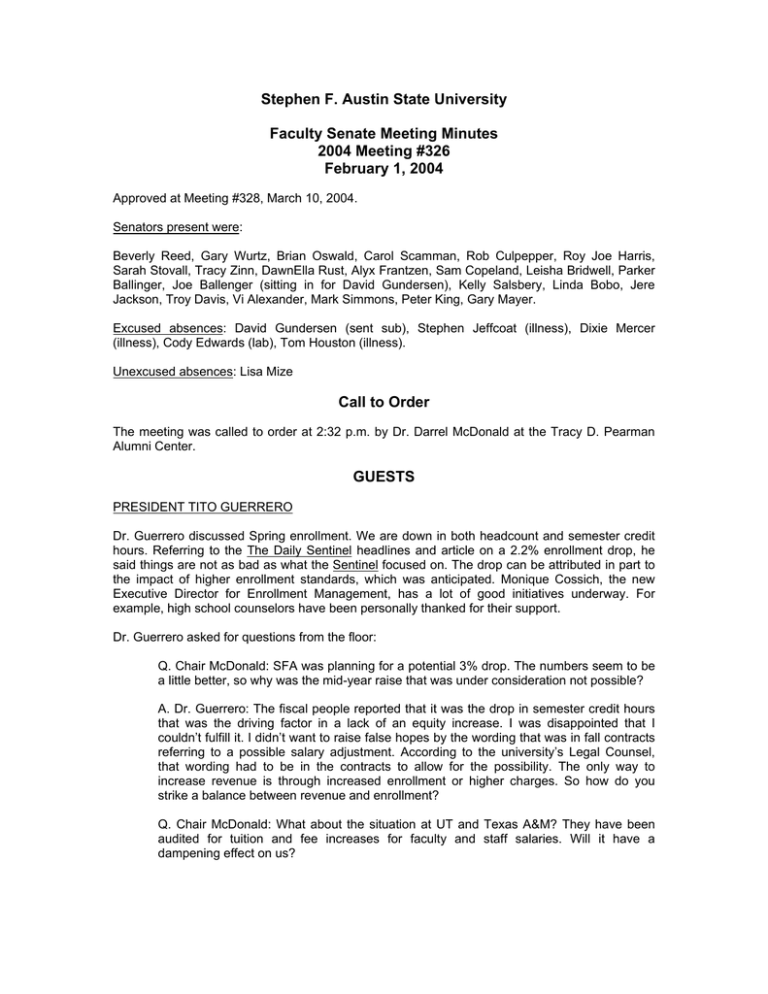
Stephen F. Austin State University Faculty Senate Meeting Minutes 2004 Meeting #326 February 1, 2004 Approved at Meeting #328, March 10, 2004. Senators present were: Beverly Reed, Gary Wurtz, Brian Oswald, Carol Scamman, Rob Culpepper, Roy Joe Harris, Sarah Stovall, Tracy Zinn, DawnElla Rust, Alyx Frantzen, Sam Copeland, Leisha Bridwell, Parker Ballinger, Joe Ballenger (sitting in for David Gundersen), Kelly Salsbery, Linda Bobo, Jere Jackson, Troy Davis, Vi Alexander, Mark Simmons, Peter King, Gary Mayer. Excused absences: David Gundersen (sent sub), Stephen Jeffcoat (illness), Dixie Mercer (illness), Cody Edwards (lab), Tom Houston (illness). Unexcused absences: Lisa Mize Call to Order The meeting was called to order at 2:32 p.m. by Dr. Darrel McDonald at the Tracy D. Pearman Alumni Center. GUESTS PRESIDENT TITO GUERRERO Dr. Guerrero discussed Spring enrollment. We are down in both headcount and semester credit hours. Referring to the The Daily Sentinel headlines and article on a 2.2% enrollment drop, he said things are not as bad as what the Sentinel focused on. The drop can be attributed in part to the impact of higher enrollment standards, which was anticipated. Monique Cossich, the new Executive Director for Enrollment Management, has a lot of good initiatives underway. For example, high school counselors have been personally thanked for their support. Dr. Guerrero asked for questions from the floor: Q. Chair McDonald: SFA was planning for a potential 3% drop. The numbers seem to be a little better, so why was the mid-year raise that was under consideration not possible? A. Dr. Guerrero: The fiscal people reported that it was the drop in semester credit hours that was the driving factor in a lack of an equity increase. I was disappointed that I couldn’t fulfill it. I didn’t want to raise false hopes by the wording that was in fall contracts referring to a possible salary adjustment. According to the university’s Legal Counsel, that wording had to be in the contracts to allow for the possibility. The only way to increase revenue is through increased enrollment or higher charges. So how do you strike a balance between revenue and enrollment? Q. Chair McDonald: What about the situation at UT and Texas A&M? They have been audited for tuition and fee increases for faculty and staff salaries. Will it have a dampening effect on us? A. Dr. Guerrero: We raised tuition to $46/SCH, which is just below the deregulation realm. We’ll have to venture there. Right now SFA is in the bottom tercile in terms of what we charge. Q. Senator Reed: What is the outlook for this coming fall? A. Dr. Guerrero: I don’t know. It’s hard to predict. What can students tolerate? I am being pulled in a number of different directions on pay equity. I want to fulfill my commitment to pay equity, but what about the people who deserve merit or cost-of-living raises? Q. Dr. Ballenger: Is that 2.2% we are down compared to fall or spring? A. Dr. Guerrero: Last Spring. That’s just in undergraduate enrollment. Graduate enrollment is up. This summer starts a base period. The base period is basically a “snapshot of the university” which the Legislature uses to determine funding for the future. Q. Dr. Ballenger: Why is it going up in graduate programs? A. Dr. Guerrero: At the state level, there has been discussion about what does it cost to deliver courses in different disciplines. I was on an advisory committee. What if we were funded according to the actual cost of delivering programs? SFA would gain $1.2 million. TWU would lose funds. The vote was 10-8 for a compromise position. Q. Dr. Ballenger: Why did graduate enrollment increase? A. Dr. Guerrero: In the Department of Mathematics the NSF grant was a factor. We have partnerships with school districts to help subsidize teachers’ graduate tuition. International students are our fastest growing cohort. We’ve had an increase in minority students, particularly African-American and Hispanic students. Q. Senator Rust: Is funding for this year’s summer school okay? A. Dr. Guerrero: Yes. There are no changes in how faculty are compensated for summer. Q. Senator Oswald: He has heard concerns expressed about using an outside firm for SFA’s new marketing campaign. Was there any effort made to involve SFA’s Department of Marketing and Management in designing the campaign? A. Dr. Guerrero: Some people from the Department of Marketing and Management were involved. The firm hired are folks who’ve been around for awhile, and they know higher education. A. Senator Ballenger: It is preferable to use an outsider. There’s no introduction of bias that way. I’m a member of the Department of Marketing and Management, and I think it’s better to use an outside firm to avoid bias. Q. Senator Wurtz: We have read reports that the NCAA is investigating the men’s basketball team. Can you give us any idea why? A. Dr. Guerrero: Yes. There are only so many things I can say. There was behavior that was recognized as having been inappropriate. We reacted, but too late according to the NCAA. It is a secondary violation. There was a prior problem they investigated in the women’s basketball program regarding the provision of textbooks to players without charge from a local bookstore. So, they are taking a harder look at us now. It is nothing salacious or scandalous. Dr. Guerrero reported that the School of Social Work was accredited for eight years unconditionally. PROVOST MARY CULLINAN 1. Dr. Cullinan reported that they have conducted phone interviews with eleven people for the position of Dean of the College of Business. Some new hires have already been made for Fall ’04. A new ad is coming out in the Chronicle of Higher Education. 2. They are still in the middle of the planning process. There is now a Provost’s web page. They held a planning retreat. There is a communiqué from her on the web. 3. She is delighted about the Residence Hall Scholarships. A one-year pilot was approved by the Board. Two are allotted per department. This was the chairs’ idea. 4. She is pushing to work more closely with community colleges. She is going to meet with representatives from Panola College there and with Angelina College here. She wants closer relationships with “feeder colleges” who send us academically strong students. 5. She has a group to work with the honors curriculum. It will involve aggressive fundraising, broadening it across colleges, and getting students excited. 6. The Provost went to her first national provosts’ meeting. We are much better off here; higher education is really hurting elsewhere. Dr. Cullinan then asked for questions from the Senate: Chair McDonald commented that the dorm scholarships are a good thing. Q. Senator Alexander: Have we tapped high school counselors? A. Yes. Q. Chair McDonald: We have administrative interaction with faculty on the agenda. Would she please state her position on how the relationship should be between faculty and administrators regarding tenure and promotion. A. Dr. Cullinan: I hope we would all work together and want the same thing: retention and recruitment. I think we need a strong professional development process. We should hammer out problems. There should be information exchange at every stage. Q. Chair McDonald: Do you make policy or do the administrators? A. Dr. Cullinan: I make policy and the decisions. I turn to the President and the Board. We answer to them. A. Dr. Guerrero: Policy can come from a variety of places. We must put a stop to removal of documents without knowledge. You tell us how you want it to be. We have to come to a decision and an understanding on what goes in a folder. The removal of documents was inappropriate. It is unacceptable to remove without a candidate’s knowledge. The administration acted on it as soon as it was brought to their attention. It was his understanding that the candidate was aware of the removal of the letter of recommendation. The vote on tenure was negative at the department level and unanimously positive at the college level. A. Dr. Cullinan: There have been practices and processes that are not uniform across campus. We have to have a conversation, hear from many groups, put things in writing, and follow them. I also want to see discipline specific guidelines in departments. They need to be in writing. Departments are going to have to be responsible for that. Q. Senator Copeland: What about those up for tenure now? A. Dr. Cullinan: The changes are for Fall ’05. We will work with what we have now. CHAIR’S REPORT Chair McDonald reported that the Academic Planning Committee met to determine areas that the group would focus on in their planning exercises. We had met with Dr. Guerrero and Dr. Cullinan concerning tenure and promotion issues. CHAIR ELECT’S REPORT I. Graduate Council. Have met twice since the last senate meeting. A new school math teaching major has been approved at the graduate level. Provost is considering recommendations regarding limited membership. Grad assistant apps. are online, but can't be submitted that way.. New statement on GA apps re: "conviction of a felony." Library collecting $ for shipping and postage used for mailing theses copies. Grad office moving to 4th floor of LAN. Lots of discussion regarding new major in Forest Resource Interpretation (Forestry.) Approved by council to go to Provost. Numerous new courses have been proposed and are currently under evaluation, to be discussed at next meeting. Academic Planning Committee- Retreat took place on 1/14/04. Lots of ideas were exchanged and discussed about (but not limited to) student recruiting and retention; university outreach; curriculum; and faculty and staff support, recruiting and retention. Dr. Standley presented on "assessment overview." Monique Cossich had a brief report on recruiting and retention. Salary Equity Committee- Latest data is being used to establish new benchmark salaries for every position on campus, in the event there may someday be money to fund them. Senators Salsbery and Reed asked what the salary benchmarks were for salary equity. Are they published? Dr. Larry King replied that they are given to chairs. They are not published. They could ask the Professional Welfare Committee to look into it. Making an Open Records request is another option. TREASURER’S REPORT The Treasurer distributed a copy of the budget account report. A small amount of student wages are not reflected on that report. The Senate has a balance of $3, 474.63. There has been talk of using unspent funds to upgrade the Senate’s PC (which runs Windows 95) to a laptop. SECRETARY’S REPORT Senator Scamman is filling in as the secretary for this meeting for Senator Mercer. She will get the minutes out as soon as possible. Senator Mercer will need to add in resolution numbers later if any resolutions are passed. If Senate goes into Executive Session, minutes will be kept separately for the Executive Session. They won’t be posted or distributed outside of the Senate. Chair McDonald remarked that the text of the online Constitution still needs to be straightened out. COMMITTEE REPORTS ACADEMIC AFFAIRS • No report. ADMINISTRATION AND FINANCE • No report. ELECTIONS • Senator Scamman reported that Dr. Garland Demarcus (Mark) Simmons was elected to complete Dr. Mike Stroup’s term in the College of Business. Her committee has been working with Dr. Alexander’s committee on apportionment. FACULTY GOVERNANCE AND INVOLVEMENT • Senator Alexander’s committee has made calculations on apportionment. Senator Scamman provided her committee with some corrections to the Faculty Senate Roster that affect the calculations. They have worked closely with the Committee for Elections. PROFESSIONAL WELFARE • No report. ETHICS • Senator Davis had an information item. He wants to put to rest the rumor that he or his committee is sponsoring a resolution for a vote of no confidence for certain administrators. It is NOT TRUE. Chair McDonald was approached by some faculty members about whether the Senate’s Constitution has any provisions for a vote of no confidence. It does not. Senator Davis was asked to survey how other universities, especially Faculty Senates’ constitutions, handle votes of no confidence. Most don’t spell it out. Some have provisions for votes of no confidence for upper level administrators. Usually it’s handled at the college level for deans. Some Faculty Senates may assist. Chair McDonald reiterated that there is no move underfoot for a vote of no confidence. The survey arose from an informal request of some faculty about the procedure. ANNOUNCEMENTS Senate Chair McDonald made the following announcements: He welcomed new Senator Dr. Mark Simmons who is completing the remainder of Dr. Michael Stroup’s term. APPROVAL OF MINUTES Senator Alexander said that her name should be added to the list of those present at Meeting #325. Senator Oswald made a motion to accept the Minutes for Meeting 325 as corrected. Senator Frantzen seconded. Passage was unanimous. NEW BUSINESS Chair McDonald said the removal of documents from tenure packets is a special item issue. A letter was distributed by deeply concerned faculty. Two special meetings of the Faculty Senate Executive Committee have been held. The letter contains two main requests: 1. An immediate stop to the practice of file manipulations 2. That the Faculty Senate hold a special single issue meeting to deal with the requests. The text of the letter sent to all faculty members is inserted here for the record: “To: Faculty Members Regarding Tenure, Promotion and Merit Applications and Evaluations In early December a preliminary grievance hearing on denial of tenure in the College of Liberal Arts was heard by a panel of five faculty members. The ultimate vote was three to two against the faculty member. While on a personal level that is regrettable for the faculty member involved, nevertheless, the hearing raised issues of grave importance that every faculty member should know. This is a particularly important matter for tenured faculty in view of up coming post tenure review programs. For non tenured faculty it is crucial. It is also of immediate importance to all promotion and merit decisions. The undersigned faculty have requested a special issue meeting of the Faculty Senate and we urge every faculty member to attend that meeting if it is called. The vital concern of the undersigned faculty is that apparently the removal of documents from faculty applications for tenure, promotion, and merit is, if not a routine practice, also not an uncommon one. Such actions, in the view of the undersigned faculty, constitute unethical behavior, a betrayal of faculty-administrative trust, and a falsification of another person’s record, detrimental to good name and professional reputation. Moreover, it casts doubt and suspicion on the integrity of every tenure, promotion, and merit decision in the past two decades. In the December hearing: One dean testified to removal of a letter from the faculty member’s application because he deemed that the letter, from a distinguished and senior Regents Professor, was too favorable to the candidate for the faculty panel to see. The idea that full time, tenured, professional faculty members might be overawed by a letter from a Regents Professor would be amusing were it not demeaning. Why on earth would faculty and administrators not want the opinions of their most experienced and honored colleagues? A former dean testified that he approved of the removal of such material. He further argued that the removed letter was of “no consequence” because the college panel, which never saw it, voted unanimously for tenure. However, if it was of no consequence, why was the letter removed before the panel saw it? The only sensible answer is that it was important, and it was important to the dean that faculty in the peer review process not see it. It was favorable to the Candidate. While the college panel did support tenure for the faculty member, it did not support promotion. If one argues that the removed letter was of no importance because of the panel’s pro tenure vote, one could argue equally that it was of considerable importance on the second college panel vote because the vote on promotion was negative. Indeed, if the letter had remained in the packet, justifications on both the tenure and promotion votes might have been significantly strengthened given that the favorable letter removed was written by the leading expert in the field on this campus. Finally, another current dean testified that he had removed material from packets in the past. He stated that it was a dean’s judgment call, his prerogative. He testified rather virtuously that he always returned such items to the packet when he sent it on to other administrators, presumably more trustworthy and omniscient than faculty members on a peer review panel. The same dean further testified that he saw no obligation or necessity to notify faculty of his acts. (To notify faculty of removal of documents or materials or to order faculty or chairs not to include such material is, in our opinion, coercive and intimidating; not to notify faculty is dishonest. Above all, to remove anything from a faculty packet is reprehensible). This tainted process vitiates the tenure decisions on this campus, degrades peer review but, even more importantly, reflects a corrupted process and a venal approach to administration. How on earth can non-tenured faculty ever present their true opinion openly or expect honest dialogue, much less place their trust in such administrators? How can tenured faculty members trust that nothing will be removed from their posttenure review processes? If letters of recommendation and/or evaluations are removed, how safe are student and peer evaluations or indeed anything in an application packet? You may at this time have a dean whom you trust not to do such a thing, but in the December hearing, two deans and a former dean, representing three colleges on campus, testified to the practice. It is a practice that has been on going, one that apparently has been sanctioned by past and present administrations, and one which clearly violates the professional integrity of the academic community. We ask the faculty senate: To meet on this single issue, To condemn the unprofessional and dishonorable conduct of removing, and in our opinion, the falsifying of faculty records, To pass a resolution calling for the immediate and permanent end to the practice by all administrators, To pursue this matter, if necessary, to the Board of Regents and to all appropriate professional organizations. This is not a time for lengthy committee meetings and negotiations about future procedure. That may come later but only after the administration ends what one former dean testifying in the hearing termed a “despicable” practice. Respectfully, Signature Page: Dr. Deanne Malpass, Department of History Dr. Thomas W. Segady, Department of Sociology Dr. John W. Dahmus, Department of History, Chair, Faculty Senate, 1996-1997 Dr. Lauren Scharff, Department of Psychology Dr. James E. Corbin, Department of Sociology Dr. James E. Howard, Department of Economics and Finance, Chair, Faculty Senate, 1987-1988 Mrs. Eloise Adams, Director, Arts Center Mrs. Tina T. Oswald, Head of Reference, Ralph W. Steen Library Dr. Joseph A. Devine, Department of History, Chair, Faculty Senate, 1982-1983; 2001-2002 Dr. Robert N. Mathis, Department of History, Chair, Faculty Senate, 1980-1981 Dr. Kenneth H. Price, Department of Mathematics and Statistics, Chair, Faculty Senate, 1984-1985 Dr. Jill A. Dumesnil, Department of Mathematics and Statistics, Chair, Faculty Senate, 1999-2000” Chair McDonald is making tentative arrangements for a meeting next Wednesday at 3:00 PM m open to the entire faculty to discuss it as a campus-wide issue. There were a number of questions about what happened: Q. Joe Ballenger: Was it illegal? A. Chair McDonald: There is no criminal investigation. I can’t comment on the legality. A. Senator Wurtz: I personally interviewed the current deans. Two admitted to document removal. They cited policy. It could not be found in university policy. A. Dr. Larry King: In the second of the Executive Committee meetings, I asked Dr. Marlin Young, “Under what policy?” He was handed a copy of university policy and could find nothing. I cannot in good conscience let stand several things Dr. Guerrero said in his remarks. The President said the departmental committee vote was negative. It was positive—by one vote. The material was accidentally returned to that person. They did not know it had been removed. A. Dr. Barbara Michaels: She was the faculty member whose tenure was involved. She found out by accident that a letter of recommendation had been removed from her packet. The departmental vote was three positive; one negative. One vote was counted as negative by the chair. It should have been an abstention. The vote was counted as 3 to 2. Q. Joe Ballenger: Were any laws broken? A. Dr. Michaels: Two attorneys on the grievance panel said, “Yes”. Chair McDonald reminded the Senate that they were there to discuss holding a special-issue meeting. • Dr. Deanne Malpass, Department of History, addressed the Senate. Her remarks are summarized below; She said she is a lawyer, but she was not addressing a legal question. She was addressing an ethical issue. She wanted to thank the twelve faculty who signed the letter. She wanted that in the record. She thanked those who called and emailed. She didn’t know Barbara previously. This is not about a single case. This is about inappropriate behavior. It is crucial to the integrity of an academic community. She became aware of it back in December. She is not seeking to name names. She wants it stopped. This is not a call for punitive action or a vote of no confidence. The administration had knowledge this had happened before December. On October 1 a faculty member wrote. October 6 there was a second letter to the Provost. October 16 there was a lengthy letter. The administration had notice. This happened with at least two packets that were sent up from a college this fall. A chair told them to remove chairs’ letters of support. The Dean told a chair to change a favorable report. A Regent’s Professor was told only one letter for tenure or for promotion could be written. This is not just one issue about one denial of tenure. “The packet is essentially yours. You are putting your best foot forward. It affects everyone here. We trust the judgment of our peers.” It is falsification of records. We are moving toward post-tenure review; all faculty should be concerned about the treatment of packets. We want the Faculty Senate to pass a resolution that clearly and unambiguously condemns the removal of documents and states that it stops immediately. How are packets being dealt with? The Provost said, “No further material will be altered this year. . .” The President commented that it is a tradition at SFA at an Executive Committee meeting. It’s the faculty member’s packet. It needs to go forward as a clean packet. We know bias when we see it. We have six to seven people on panels. We should elect faculty to these committees. Vote on Single-Issue Special Open Meeting of the Faculty Senate • Following Dr. Malpass’s address, there was discussion of whether or not to call a special single-issue meeting. A senator asked if it was to be a meeting on removal of documents or the tenure procedure. Chair McDonald indicated it was about removal. • The question on holding a special single-issue meeting was called. The vote was 21 in favor, 1 abstention. • Senator Oswald presented the first reading of the “Resolution Concerning the Removal of Materials from Tenure and promotion Application Packets” from the Executive Committee. • Senator Alexander asked if something should be added to the second or third resolved about not adding materials to tenure or promotion packets. Senator Oswald said he could accept it as a friendly amendment. Others pointed out that chairs add letters of recommendation to packets and that the request for a resolution was just about removal. The friendly amendment was withdrawn. • An editorial change in wording was suggested and accepted, changing the last part of the last sentence from “. . . the removal of material for tenure and promotion packets.” to “. . . the removal of material from tenure and promotion packets.” Resolution Concerning the Removal of Materials from Tenure and promotion Application Packets [Insert Resolution Number] Whereas, It has recently been brought to the attention of the Faculty Senate and the university community that two deans have admitted that they have removed materials from tenure and promotion application packets; Whereas, The Associate Vice President for Academic Affairs has admitted that, while serving as the Interim Vice President for Academic Affairs, he approved of such actions; Whereas, This action has been defended as tradition; Whereas, There is no duly approved policy that allows for the removal of materials from promotion or tenure application packets; Whereas, Such an action is a clear violation of Policies E-50A and E-3A; Whereas, Such an action is a violation of trust and generally expected standards of professional behavior; Whereas, The Provost has called for no one to remove materials from tenure and promotion packets for this year and the reinstatement of any materials that have been removed from packets this year; and Whereas, The Provost has called for the Faculty Senate to provide her suggestions for how to resolve this and other problems with the tenure and promotion process; now, therefore, be it Resolved, That the Faculty Senate commends the Provost for the leadership she has demonstrated in relation to this issues and accepts the call of the Provost to provide input for changes in the tenure and promotion process; and That the Faculty Senate condemns the practice of removing materials from tenure and promotion application packets as unethical, a violation of university policy, and a violation of trust and professional standards of behavior; and That the Faculty Senate calls for a permanent ban on the removal of material from tenure and promotion packets. After further discussion, Chair McDonald reminded the Senate that the Faculty Senate’s Executive Committee was responding to the request in the letter brought forward by the appropriate number of people. • The first reading of the resolution (with the change in wording) passed on a unanimous voice vote of 22 in favor; none opposed. Chair McDonald asked Senator Scamman to obtain the most recent email distribution list of faculty from ITS, so that they could be notified of next Wednesday’s meeting. The School of Social Work sent an email with a resolution approved on Feb. 4, 2004 in support of the Faculty Senate’s actions dealing with removal of material from packets. The text is inserted below: “The Social Work Faculty strongly supports the Faculty Senate in pursuing its inquiry into the alteration of promotion and tenure documents by the Deans. We further encourage the Senate to broaden its inquiry to include decisions related to developmental leave, research, faculty development, and other personnel decisions, to maintain the fairness and integrity of the process. Passed unanimously 2/04/04” OLD BUSINESS Tenure and Promotion Recommendations Senator Oswald, Chair of the Academic Affairs Committee, reported progress on gathering copies of policies in use by departments and colleges. Many do not have a policy as indicated on a spreadsheet he prepared. Some, such as the College of Education, report they follow their colleges policy, but no policy could be located. Senator Rust said she was given a policy to follow from the College of Education when she applied for tenure. It turns out these were brief guidelines for preparation of packets and not a policy. Senator Oswald emphasized that we need to distinguish between official university policy as approved by the Board of Regents and guidelines, practices, and procedures. The term policy has been applied rather loosely to things that are not really policy. Many so-called policies would more rightly be termed guidelines, as only the Board approves official university policy. Other procedures, practices, and guidelines need to comply with university policy. The Provost is urging us to tell her what we would like to see in a revised tenure policy. We need to let her know as soon as possible. Executive Session Senator Oswald moved and Senator Frantzen seconded that Senate meet in Executive Session to discuss personnel matters arising from the document removal and tenure packet issue. Dr. Larry King asked whether he should stay or leave. Chair McDonald ruled that as Immediate PastChair he could stay. Senate voted unanimously to go into Executive Session at 4:35 p.m. Senate voted unanimously to recess the Executive Session at 4:51 p.m. and to continue it following next Wednesday’s open meeting. ADJOURNMENT Senate voted unanimously to adjourn the regular session at 4:52 p.m. Respectfully submitted, Carol Scamman, Acting for Dixie Mercer, Secretary Faculty Senate

